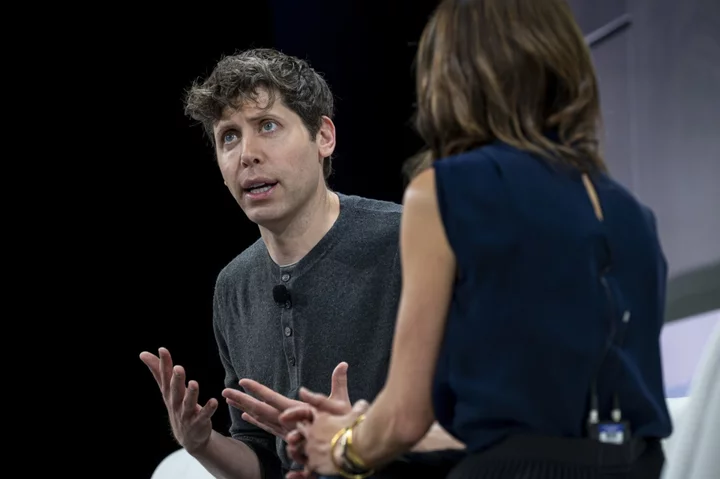Qualcomm Inc. Chief Executive Officer Cristiano Amon said his company has been working on high-performance chips that should soon help power generative artificial intelligence applications on smartphones.
Amon said as soon as next year, some smartphone models powered by Qualcomm chips may have the power to use generative AI applications for photos and images, such as Stable Diffusion’s model.
“We’re just at the very beginning” of understanding generative AI, Amon said in an interview with Bloomberg Television’s Ed Ludlow. “There’s going to be so many applications.”
The CEO said generative AI will also be useful in self-driving cars, particularly when a rider gives the automated system complicated directions. AI processors in these cars need to make decisions “in real time,” Amon said, and “that computation needs to happen locally” with powerful chips in the car rather than relying on the computing power of the cloud.
Bloomberg News is hosting its annual US Technology Summit in San Francisco, focused on the industry’s most intriguing topics, from artificial intelligence and the future of transportation to social media and cryptocurrencies. At the event Thursday at SVN West, titled “Tech’s Turning Point,” speakers include OpenAI CEO Sam Altman, Amazon Web Services CEO Adam Selipsky, venture capitalist Reid Hoffman, San Francisco Mayor London Breed and Airbnb Inc. CEO Brian Chesky.
Watch LIVE here. All times are local in San Francisco.
Amazon Spending $100 Million to Help Cloud Clients with AI (9:30 a.m.)
Amazon.com Inc.’s cloud unit is building a program to help customers develop and deploy new kinds of artificial intelligence products as the biggest seller of cloud services tries to match Microsoft and Google in the market for so-called generative AI.
Amazon Web Services is investing $100 million to set up the AWS Generative AI Innovation Center, which will link customers with company experts in AI and machine learning. They’ll help a range of clients in health care, financial services and manufacturing build customized applications using the new technology.
Read More: Amazon Is Spending $100 Million to Teach Cloud Clients About AI
Inflection AI Drops New Model for Personal Assistant (9:21 a.m.)
Artificial intelligence startup Inflection AI announced at the tech summit that it’s releasing a new large language model — the kind of AI system that underlies generative tools like ChatGPT — to power its Pi personal assistant product. Called Inflection-1, the LLM is supposed to outperform OpenAI’s GPT-3.5 chatbot in terms of computing, according to the company.
Inflection AI CEO Mustafa Suleyman called artificial intelligence “the most radical transformation of our lifetime” during a panel discussion at the summit. Reid Hoffman, who co-founded LinkedIn and is a partner at VC firm Greylock Partners, added that Inflection AI’s Pi chatbot takes a more personal, emotional approach compared with ChatGPT. “IQ is not the only thing that matters here,” he said. “EQ matters as well.”
Sam Altman Cautions Against Over-Regulation of AI: (8:45 a.m.)
Sam Altman, chief executive officer of ChatGPT creator OpenAI, said lawmakers around the world should be careful not to “overdo” regulation of artificial intelligence and that it should be limited to “existential risk-level” systems.
In an onstage interview, Altman said all powerful technologies can be used in dangerous ways, and AI is no different: “Things will go wrong,” he said, citing potential cybersecurity risks among others. The world can manage those risks through global regulation, Altman said, but regulations should only be on “these powerful existential risk-level systems” and “you don’t want to overdo it.”
The upsides to developing and improving upon AI systems are so tremendous that the world shouldn’t try to stop the technologies from happening, Altman said, citing the potential for better educational systems and healthcare.
“At this point, given how much people see the economic benefits and potential, no company could stop it,” he said. But global regulation “can help make it safe — which is a better answer than stopping,” Altman said. “I also don’t think stopping it would work.”
Read More: OpenAI CEO: AI ‘Most Important Step Yet’ For Humans and Tech
--With assistance from Emily Chang, Natalie Lung, Eari Nakano, Priya Anand, Hannah Miller and Ed Ludlow.

